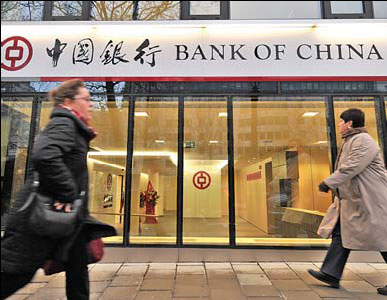Chinese banks to speed up overseas expansion
Updated: 2011-11-15 07:43
By Tan Yingzi (China Daily)
|
|||||||||
HONOLULU - In keeping with China's trend of putting more money into outbound investments, Chinese bankers are showing a resolve to expand their businesses overseas.
 |
|
A Bank of China branch in Brussels that opened in December 2010, becoming the first branch of a Chinese mainland bank in Belgium. [Xinhua] |
The move in that direction comes following the recent world financial crises and in the midst of turmoil in the eurozone, when many large Western banks are having difficulties ensuring they have adequate stores of capital.
"It is inevitable that Chinese banks will expand into other parts of the world," Xiao Gang, chairman of Bank of China, one of China's biggest lenders, said at the Asia-Pacific Economic Cooperation CEO Summit on Saturday.
"But we must be very careful and cautious about how we manage risks."
Bank of China provides financial services in more than 30 countries and regions, making it the most international bank on the Chinese mainland, Xiao said.
He said his counterparts are also looking toward the future and thinking about ways to succeed amid new economic circumstances and to make use of Internet and mobile technologies.
"The future development of Bank of China also requires transformation and innovation," Xiao said.
He said the eurozone's debt troubles have had little effect on Chinese banks, which hold only a small amount of debt in euro bonds. Now is a good time for them to consider expanding into overseas markets, he said.
"For instance, because there is less fluidity in the European market, some companies in the Asia-Pacific region may now have difficulty obtaining financing," he said. "That gives us a chance to do business with them."
Chinese companies' expansion into other parts of the world has meanwhile stoked the demand for doing business with Chinese banks, said Wang Lili, executive director and senior executive vice-president of Industrial and Commerce Bank of China (ICBC).
The bank, which is the largest in the world measured by market capitalization, is also trying to expand outside of the country, she said.
Wang, who also is a member of the Asian-Pacific Economic Cooperation Business Advisory Council, said she sees huge opportunities in the Asia-Pacific region.
"Most of ICBC's overseas branches are set up in Asia," she said. "Since this year, we have also been looking at opportunities in Latin America, in Brazil, Argentina and Peru, for example."
Xiao warned that Chinese banks will not find it easy to do business overseas.
Bank of China has found that its overseas branches are less profitable than its domestic ones, in part because of the recent appreciation of the renminbi and in part because foreign countries do little to control their currencies' exchange rates.
Other difficulties for Chinese banks come from politics.
"Doing business in countries such as Libya brings a high risk," he said.
Another hurdle is Chinese banks' lack of employees who have experience dealing in international finance, trade and communications.
"We need people who know how to do international mergers and acquisitions and how to deal with different cultures."











